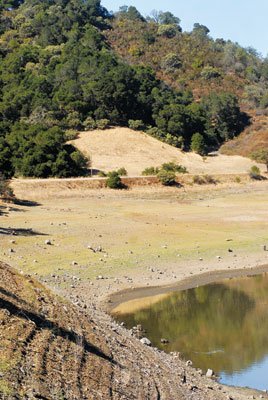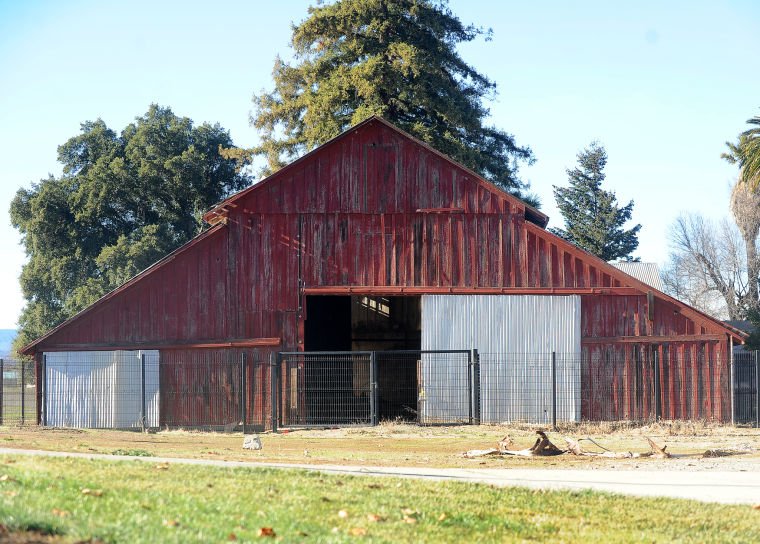City Council passed an emergency ordinance last week in response to a statewide mandate that California’s cities must cut their water usage by up to 20 percent.
In a unanimous decision Aug. 4, the council implemented a series of mandatory restrictions, including limiting the number of days and hours Gilroyans can water their lawns and prohibiting restaurants from serving water unless guests request it.
Since January, citywide water consumption dropped by 8.4 percent without any mandatory regulations—but that’s not enough to meet the state’s goal, the council ruled. If these restrictions were not adopted, the City could risk hefty state fines, City officials said.
“It’s getting serious,” said Mayor Don Gage. “If it gets really, really serious we’re going to have to cut water off from watering lawns and gardens and just have the basics.”
The City will set up a hotline for residents to call if they see someone wasting a significant amount of water.
“It’s complaint driven,” Gage said. “We’re not going to have people running around looking. It’ll be for obvious things, like people washing cars with a hose or running water into the street.”
To add teeth to the new regulations, the City will use two additional part-time code enforcement officers—originally hired to enforce the controversial sign ordinance currently under review—who will follow up on complaints and issue warnings and fines if necessary.
“We have been and continue to be in a severe drought—the worst in recorded history in California,” said Dennis Kennedy, South County’s director of the Santa Clara Valley Water District. “Gilroy has made some progress in conservation, but there’s room for more and the ordinance should help achieve a 20 percent reduction.”
The ordinance establishes a three-tiered system for water restrictions. The council implemented the first level of water-saving measures at the Aug. 4 meeting, which prohibit residents from watering or irrigating landscapes or lawns between 9 a.m. and 5 p.m., and limits the time anything can be watered to 15 minutes. Gilroyans can only water their lawns three days a week, according to the new regulations. The level one regulations took effect Aug. 1, retroactively.
If the council declares a level two water shortage, calling for a cut in consumption by up to 35 percent, the council has the ability to raise water rates through a tiered system and restrict Gilroyans from watering more than two days a week. But the City can only increase water rates if consumption doesn’t fall below 20 percent and officials commission a study, City Administrator Tom Haglund said. Similarly, the Santa Clara Valley Water District may also hike the rates for users if the goal isn’t reached.
“The idea would be to avoid double punitive effort,” Haglund explained. “At the same time, this is only articulating what the council may consider. It does meet part of the regulation promulgated by the state in providing that option. It may or may not ever be acted upon.”
But if the council declares a level three water shortage, calling for a 50 percent decrease in consumption, watering is prohibited altogether. The City could potentially shut off water to “willful violators,” according to the ordinance.
The Water District committed funding to hire between five and 10 water waste inspectors—referred to as “water cops”—but they cannot penalize violators, Kennedy said. The responsibility to dish out penalties and fines falls on cities and private water companies across California.
According to City Operations Manager David Stubchaer, water suppliers—including the City—could be fined up to $10,000 a day if they ignore the state water board’s mandate to take measures to reduce water consumption. Adopting the ordinance was a way for the City to comply with the state water board’s demands and conserve water during the drought, he said.
“The Governor has highlighted this as a very important measure for every water retailer to take, regardless of their situations,” Haglund added.
As of presstime, the City has not yet established a hotline for residents to use. Gage said he doesn’t envision it as a format for neighbors to tattle on each other for minor infractions, but as a way to penalize those who willingly waste water either through a lack of concern or consideration or don’t know the rules.
“We don’t want people to rat on each other—but that’s what you have to do if you want to have water,” Gage said. “If somebody’s watering their yard every day, they need to be turned in. They may have the money to do that but they’re taking water away from everybody else. And when we run out of water, it’s too late.”













